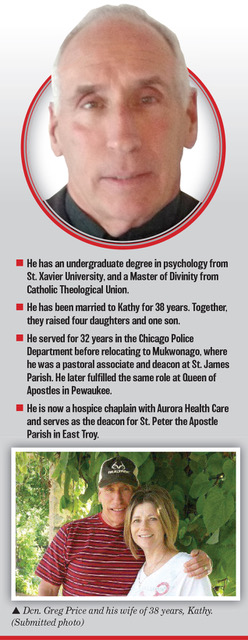Ordained in 1998 in the Archdiocese of Chicago, Dcn. Greg Price has been serving the faithful of the Archdiocese of Milwaukee for the past 20 years.
COLLEEN JURKIEWICZ
CATHOLIC HERALD STAFF
How did you get into law enforcement?
I kind of “fell into” law enforcement. When I graduated from high school, I wanted to go to college but couldn’t afford it. I learned that the Chicago Police Department had a tuition reimbursement plan, so I applied, thinking I’d quit after graduation. I got a bachelor’s degree in counseling psychology, then stayed on in the department to get graduate school paid for. What a blessing the tuition reimbursement program was — free money — almost a bribe. How could I say no?
Do you miss it?
I’m retired 20 years now but still dream about being on the job. When people hear this they always say, “Are you having nightmares?” But I really think it’s more like wish fulfillment – you met Christ with his cross every day on the south side of Chicago, where I worked on the Tactical Team (plain clothes) and SWAT Team.
Did you ever run into scary situations?
I always say I met a lot of desperate guys, angry guys, hopeless guys, confused and abused guys, but I really don’t think I met many truly “bad” guys. It’s kind of a “How you see is what you see” thing. In addition to the small percentage of people who wound up on the “wrong side” of the law, you met people whose life circumstances were beyond difficult but who worked hard every day to raise their families and be good citizens — often against unbelievable odds.
You taught at the police academy for several years. What was the advice you gave to new recruits?
I would teach what I called the 90 percent-10 percent rule. It cautioned the recruits about generalizing when they hit the street. I told them they would be coming into contact primarily with about 10 percent of the population — those that displayed anti-social behavior — and the temptation would be to paint everyone with the same broad brush. But if they paid attention, they’d see that 90 percent of the folks were hard-working, God-fearing, good citizens that they’d love to have as neighbors if they got to know them.
If we went back 30 years in your life and told you that one day you would be an ordained deacon, what would you say?
I’d say, “Thank you kindly but you’ve got the wrong guy. I admire the Catholic Church but I don’t attend church regularly; I’m not sure there even is a God. I’m scared to death of public speaking, I’m far too busy, and I like using four-letter words (still do).”
What are your plans for Lenten penance this year?
Lent is always a great time for me. I always try to pump up my prayer and spiritual reading time. I don’t really give anything up other than time. I used to try to give up bakery goods but I was terrible at that. I was like a junkie — I’d stop on the way home and gobble down some brownies or donuts and eat them in the car so my wife wouldn’t know. I guess all those clichés about policemen and donuts are really true.
As a chaplain, what is it like to minister to the dying and be with people in that tender time?
Years ago, one of my patients said to me: “Help me to do this (dying) right.” Together we learned that “doing it right” always involves surrender. Toward the end, it’s usually difficult for patients to pray and they struggle with this. I encourage my patients to realize that giving up everything — even the ability to pray — is part of surrendering. And the prayer that I pray silently in their name at their bedside is Christ’s own prayer of surrender: “Into your hands I commend my spirit.”
In light of the events of the past few weeks, what do you want the faithful to remember?
Times of great difficulty can challenge our faith and perhaps make us ask: “Where is God in all this?” But I think faith is like love — rather useless unless it holds in a worst case scenario. God is always at work in this world — especially in worst-case scenarios. This is the message of the Paschal Mystery that we focus on especially during Lent. Things looked pretty frightening and hopeless from the perspective of Good Friday but we know that Christ’s passion and death were the condition of Easter Sunday.
